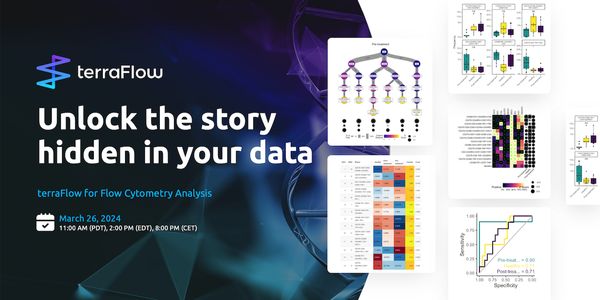Tumor development
Tumor development, or tumorigenesis, broadly describes the process by which normal cells gain malignant properties. Tumor development includes growth functions like cellular differentiation, proliferation, and metastasis.
-
APR 02, 2024 | 8:00 AMCirculating tumor cells (CTCs) and circulating tumor DNA (ctDNA) have each gained attention as promising liquid biopsy markers, offering molecular insights into cancer progression, overall s...MAR 28, 2024 | 8:00 AMB cell responses within pancreatic ductal adenocarcinoma (PDAC) tumors are associated with improved patient outcomes, yet the specific triggering antigens remain largely unknown. In this web...MAR 26, 2024 | 7:00 PMC.E. CREDITSThe implementation of a preemptive pharmacogenomics (PGx) program in a hospital setting requires a multidisciplinary approach to ensure seamless integration of each stage of the process for...Speaker: Steven Melnick. Ph.D., M.D. , Dr. David Mancuso, Pharm.D. CPh , MSPMSponsored By: Thermo Fisher ScientificMAR 26, 2024 | 11:00 AMEver wonder what you’re missing in your data? The sheer complexity of today’s flow and mass cytometry datasets demands automated solutions. Machine learning plugins only provide...MAR 26, 2024 | 8:00 AMC.E. CREDITSThe implementation of a preemptive pharmacogenomics (PGx) program in a hospital setting requires a multidisciplinary approach to ensure seamless integration of each stage of the process for...Speaker: Steven Melnick. Ph.D., M.D. , Dr. David Mancuso, Pharm.D. CPh , MSPMSponsored By: Thermo Fisher ScientificFEB 28, 2024 | 10:00 AMMariana Kiehl (Sr. Applications Scientist at Roche Sequencing & Life Science) describes the KAPA Total Prep FFPE workflow, a novel single-tube method for combined sequencing of DNA and R...Proliferation biomarkers are proteins that are up-regulated in growing cells. Immunological staining of tumor tissue can provide an indication of the aggressivity of the tumor and provide in...
FEB 15, 2024 | 8:00 AM
Macrophages can mediate phagocytosis of cancer cells and cytotoxic tumor killing, and engage in effective bidirectional interactions with components of the innate and adaptive immune system....
...
Speaker:
Matija Snuderl, MD
Pathology Perspective: Discover the critical need for genomic testing in cancer and explore the differences between traditional tissue biopsies and liquid genomic profiling. We'll dive i...
Speaker:
Dr. Shuko Harada
, Dr. Aakash Desai, MBBS, MPH
Presented at: Precision Medicine in Solid Tumors
NOV 29, 2023 | 9:00 AM
Tumor genomic profiling can be complicated, especially for diseases that commonly have multiple different genomic biomarkers of interest, such as non-small cell lung cancer (NSCLC) and color...
NOV 16, 2023 | 10:00 AM
Across various stages of the clinical oncology workflow, from panel design to genomic testing and molecular tumor boards, the identification and validation of actionable genomic alterations...
NOV 07, 2023 | 10:00 AM
In the last 5 years, the US Food and Drug Administration has approved 4 anti-CD19 chimeric antigen receptor T cell (CART19) products for relapsed/refractory B cell lymphomas and leukemia. Ho...
NOV 01, 2023 | 8:00 AM
To bring your cutting-edge cell and gene therapies to the patients that need them as quickly as possible, you need access to the most knowledgeable scientists, innovative technologies, metho...
OCT 30, 2023 | 8:00 PM
Description: Join this two-part webinar to learn how capillary electrophoresis (CE) complements sequencing technologies, such as next generation sequencing, that are being used by cancer res...
OCT 26, 2023 | 8:00 AM
In the era of advanced biotechnology, automation plays a crucial role in accelerating cancer research. Next-generation sequencing (NGS) technology has revolutionized cancer research, but lab...
Speaker:
Nicholas Lodato, Ph.D.
, Enrique Neumann, Ph.D.
Sponsored By: Beckman Coulter Life Sciences
OCT 26, 2023 | 8:00 AM
Description: Join this two-part webinar to learn when capillary electrophoresis is an ideal choice relative to other various sequencing technologies – such as next generation sequencin...
OCT 12, 2023 | 8:00 AM
Patient-derived tumoroids, also known as cancer organoids, hold potential as cost-effective models for cancer immunotherapy research. Patient-derived tumor models, which mimic the tumor micr...
OCT 11, 2023 | 9:00 PM
Epigenetic modifications such as DNA methylation have long shown promise as potential biomarkers to diagnose and guide treatment of many human diseases, including multiple types of cancers....
Speaker:
Dr. Lucia Anna Muscarella, Ph.D.
, Dr. Cristina Guillén, Ph.D.
Sponsored By: Thermo Fisher Scientific
OCT 10, 2023 | 10:00 AM
C.E. CREDITS
For patients with advanced non-small cell lung cancer (NSCLC), tissue samples are typically small biopsies. These samples undergo standard of care evaluation for >10 biomarkers to identif...
OCT 10, 2023 | 9:00 AM
Numerous studies have shown that homologous recombination deficiency (HRD) is a genome-wide biomarker present in high grade ovarian and breast cancers. A cancer therapeutic class, PARP inhib...
OCT 10, 2023 | 1:00 AM
Numerous studies have shown that homologous recombination deficiency (HRD) is a genome-wide biomarker present in high grade ovarian and breast cancers. A cancer therapeutic class, PARP inhib...
SEP 28, 2023 | 7:00 AM
Webinars will be available for unlimited on-demand viewing after live event. Labroots is approved as a provider of continuing education programs in the clinical laboratory sciences by the AS...
SEP 13, 2023 | 10:00 AM
Liquid biopsy is an emerging area of clinical research, particularly in the context of cancer. As a minimally invasive complementary or alternative approach to tissue biopsies, liquid biopsi...
Speaker:
Dr. Eloisa Jantus Lewintre, PhD
, Dr. Gorka Alkorta-Aranburu
, Matteo Allegretti, PhD
Presented at: The Future of Cutting-Edge Genomic Technologies for Liquid Biopsy Cancer Research
Sponsored By: Thermo Fisher Scientific
Sponsored By: Thermo Fisher Scientific
APR 02, 2024 | 8:00 AM
Circulating tumor cells (CTCs) and circulating tumor DNA (ctDNA) have each gained attention as promising liquid biopsy markers, offering molecular insights into cancer progression, overall s...
MAR 28, 2024 | 8:00 AM
B cell responses within pancreatic ductal adenocarcinoma (PDAC) tumors are associated with improved patient outcomes, yet the specific triggering antigens remain largely unknown. In this web...
MAR 26, 2024 | 7:00 PM
C.E. CREDITS
The implementation of a preemptive pharmacogenomics (PGx) program in a hospital setting requires a multidisciplinary approach to ensure seamless integration of each stage of the process for...
Speaker:
Steven Melnick. Ph.D., M.D.
, Dr. David Mancuso, Pharm.D. CPh , MSPM
Sponsored By: Thermo Fisher Scientific
MAR 26, 2024 | 11:00 AM
Ever wonder what you’re missing in your data? The sheer complexity of today’s flow and mass cytometry datasets demands automated solutions. Machine learning plugins only provide...
MAR 26, 2024 | 8:00 AM
C.E. CREDITS
The implementation of a preemptive pharmacogenomics (PGx) program in a hospital setting requires a multidisciplinary approach to ensure seamless integration of each stage of the process for...
Speaker:
Steven Melnick. Ph.D., M.D.
, Dr. David Mancuso, Pharm.D. CPh , MSPM
Sponsored By: Thermo Fisher Scientific
FEB 28, 2024 | 10:00 AM
Mariana Kiehl (Sr. Applications Scientist at Roche Sequencing & Life Science) describes the KAPA Total Prep FFPE workflow, a novel single-tube method for combined sequencing of DNA and R...
Proliferation biomarkers are proteins that are up-regulated in growing cells. Immunological staining of tumor tissue can provide an indication of the aggressivity of the tumor and provide in...
FEB 15, 2024 | 8:00 AM
Macrophages can mediate phagocytosis of cancer cells and cytotoxic tumor killing, and engage in effective bidirectional interactions with components of the innate and adaptive immune system....
...
Speaker:
Matija Snuderl, MD
Pathology Perspective: Discover the critical need for genomic testing in cancer and explore the differences between traditional tissue biopsies and liquid genomic profiling. We'll dive i...
Speaker:
Dr. Shuko Harada
, Dr. Aakash Desai, MBBS, MPH
Presented at: Precision Medicine in Solid Tumors
NOV 29, 2023 | 9:00 AM
Tumor genomic profiling can be complicated, especially for diseases that commonly have multiple different genomic biomarkers of interest, such as non-small cell lung cancer (NSCLC) and color...
NOV 16, 2023 | 10:00 AM
Across various stages of the clinical oncology workflow, from panel design to genomic testing and molecular tumor boards, the identification and validation of actionable genomic alterations...
NOV 07, 2023 | 10:00 AM
In the last 5 years, the US Food and Drug Administration has approved 4 anti-CD19 chimeric antigen receptor T cell (CART19) products for relapsed/refractory B cell lymphomas and leukemia. Ho...
NOV 01, 2023 | 8:00 AM
To bring your cutting-edge cell and gene therapies to the patients that need them as quickly as possible, you need access to the most knowledgeable scientists, innovative technologies, metho...
OCT 30, 2023 | 8:00 PM
Description: Join this two-part webinar to learn how capillary electrophoresis (CE) complements sequencing technologies, such as next generation sequencing, that are being used by cancer res...
OCT 26, 2023 | 8:00 AM
In the era of advanced biotechnology, automation plays a crucial role in accelerating cancer research. Next-generation sequencing (NGS) technology has revolutionized cancer research, but lab...
Speaker:
Nicholas Lodato, Ph.D.
, Enrique Neumann, Ph.D.
Sponsored By: Beckman Coulter Life Sciences
OCT 26, 2023 | 8:00 AM
Description: Join this two-part webinar to learn when capillary electrophoresis is an ideal choice relative to other various sequencing technologies – such as next generation sequencin...
OCT 12, 2023 | 8:00 AM
Patient-derived tumoroids, also known as cancer organoids, hold potential as cost-effective models for cancer immunotherapy research. Patient-derived tumor models, which mimic the tumor micr...
OCT 11, 2023 | 9:00 PM
Epigenetic modifications such as DNA methylation have long shown promise as potential biomarkers to diagnose and guide treatment of many human diseases, including multiple types of cancers....
Speaker:
Dr. Lucia Anna Muscarella, Ph.D.
, Dr. Cristina Guillén, Ph.D.
Sponsored By: Thermo Fisher Scientific
OCT 10, 2023 | 10:00 AM
C.E. CREDITS
For patients with advanced non-small cell lung cancer (NSCLC), tissue samples are typically small biopsies. These samples undergo standard of care evaluation for >10 biomarkers to identif...
OCT 10, 2023 | 9:00 AM
Numerous studies have shown that homologous recombination deficiency (HRD) is a genome-wide biomarker present in high grade ovarian and breast cancers. A cancer therapeutic class, PARP inhib...
OCT 10, 2023 | 1:00 AM
Numerous studies have shown that homologous recombination deficiency (HRD) is a genome-wide biomarker present in high grade ovarian and breast cancers. A cancer therapeutic class, PARP inhib...
SEP 28, 2023 | 7:00 AM
Webinars will be available for unlimited on-demand viewing after live event. Labroots is approved as a provider of continuing education programs in the clinical laboratory sciences by the AS...
SEP 13, 2023 | 10:00 AM
Liquid biopsy is an emerging area of clinical research, particularly in the context of cancer. As a minimally invasive complementary or alternative approach to tissue biopsies, liquid biopsi...
Speaker:
Dr. Eloisa Jantus Lewintre, PhD
, Dr. Gorka Alkorta-Aranburu
, Matteo Allegretti, PhD
Presented at: The Future of Cutting-Edge Genomic Technologies for Liquid Biopsy Cancer Research
Sponsored By: Thermo Fisher Scientific
Sponsored By: Thermo Fisher Scientific























